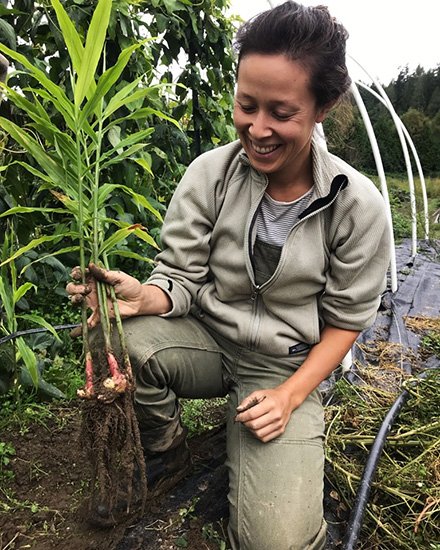Farm to Table Kamayan Farm-Style
/Kamayan Farm (Photo by Ari de Leña)
Ari, age 34, started Kamayan Farm in 2016 in a town known for Salish Lodge beside Snoqualmie Falls whose perpetual flow stirred the suds of the soapy mysteries that seldom found resolution in the fictional logging town of “Twin Peaks,” the eponymous cult television series created by director David Lynch.
One of Us in the U.S.
She belongs to the third generation of a tightknit Seattle family that emigrated from the Philippines just after V.J. Day. Her father is my first cousin, Dixon de Leña, and late grandmother is my kind and generous Auntie Adelaide “Adeling” Covey. Ari grew up in Bellevue, Washington and bade majestic Mount Rainier a brief adieu to earn a degree in Environmental Justice and Development from the University of California at Berkeley.
Ari de Leña (Photo by Jona Schuman)
“I had worked many years on other farms, both urban and rural,” Ari recalls. “I simply wanted a place where I could work the land and reconnect with how to grow food, including starting to grow heirloom Asian varietals.”
Growing Familiar Ingredients
The farm grows flowers and a changing menu of vegetables. Filipino kitchens stock up on Ari’s selection of nutritious vegetables, such as bitter melon, long beans, ginger, garlic, eggplant, sili (aka Filipino chili), and greens.
Kamayan Farms’ Bitter melon (Photo by Ari de Leña)
She explains, “Many of the vegetables that are common in a grocery store are from different climates. Tomatoes, for example, are native to South America, but we’ve bred and adapted them to grow in many different climates. Since I wanted to integrate vegetables that are common in Filipino cooking, I have also been working to find and breed varieties that can tolerate shorter, colder seasons here in the Pacific Northwest.”
Tomatoes (Photo by Ari de Leña)
Customers subscribe to weekly Veggie Boxes containing a half or full dozen of vegetables during an 18-week growing season that runs from summer to fall. They pick up their boxes at locations in and around Seattle.
“We also sell to local nonprofits, mutual aid groups, and childcare centers that are working to feed people that have limited access to fresh, culturally appropriate foods. And we work with nearby restaurants that have an interest in local food or Filipino food specifically.”
Amber Waves of Grain Waning in America?
The pachyderm in the pantry is the question how a small farm can remain a viable business amid high rents in the vicinity of the headquarters of Microsoft, Costco and T-Mobile with cranes of an Amazon expansion already swinging.
Of tilling a plot of land slightly larger than a football field, she says, “Due to government policy and the infrastructure of our agricultural system, operating a small farm in the U.S. is unfortunately not a stable profession. Most of us do it for the love of the land or for being outside, or the delight in growing our own food.”
Harvesting cilantro (Photo by Ari de Leña)
Despite the hardships, Ari says, “I definitely encourage anyone who feels called to grow their own food to find a place to do that, whether that’s in a pot on their balcony, a community garden, or by volunteering on a local farm. People learning about growing food is one of the most meaningful ways for them to understand more about our current connection or disconnection to the food system.”
She adds, “I’m really motivated by seeing others create beautiful food with my produce and taking time to pause and breathe and connect with the land.”
A Generation of Seekers
For a second-generation relative like myself, it’s refreshing to see a courageous young adult fulfill a natural hunger to find her cultural roots by taking a path that reflects her individuality. “I have been able to feel a lot more connected with my Filipino culture by simply learning how to grow our food.” Ari believes, “Stewarding the seeds of our people, putting my hands in the soil, learning more about the rituals and songs of our ancestors are part of making sense of my identity and feeling closer to our homeland and ancestors.”
“Customers subscribe to weekly Veggie Boxes containing a half or full dozen of vegetables during an 18-week growing season that runs from summer to fall.”
Ari is the youngest of five sisters, but she is speaking of her wide-roaming family in the Filipino Diaspora when she advises, “For others who are on this quest, I would say seek out parts of our culture that resonate with you. We have such a vibrant culture and a deep history of art, healing, astronomy, seafaring, weaving, dance, song, growing food, you name it! Find what speaks to you and start yearning for it or practicing it in a small way.”
Anthony Maddela is the Southern California Correspondent. He lives with his family of four and writes workforce development grants for the Housing Authority of the City of Los Angeles.
More articles from Anthony Maddela








